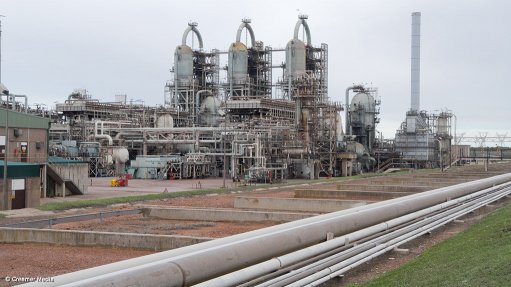
The PetroSA refinery in Mossel Bay
Photo by: Creamer Media
South Africa’s State-owned Central Energy Fund (CEF) has outlined an extensive list of support measures – including access to a portion of the fuel levy and carbon-tax proceeds – which it argued on Tuesday would help extricate the group from a “precarious financial position”, precipitated by ongoing losses at PetroSA.
The list of nine “key requests” were presented to the Portfolio Committee on Mineral Resources and Energy during a virtual meeting on May 12, held to consider the annual performance plans and budgets of entities falling under the Department of Mineral Resources and Energy.
The ‘key requests for strengthening the CEF Group’ included:
- Providing CEF with a mandate to restructure PetroSA.
- Government taking over PetroSA’s rehabilitation liabilities.
- The redirection of 25% of the fuel levy from National Treasury to the CEF to fund the group’s strategic infrastructure and growth projects, including the development of a liquefied natural gas (LNG) import terminal and a new crude refinery.
- The designation of CEF to execute the LNG projects.
- The allocation of carbon-tax funds to CEF to fund new energy initiatives, such as a biofuel refinery.
- The transfer of an unspecified Transnet pipeline to CEF.
- The takeover, by CEF, of key energy infrastructure assets on behalf of government.
- The right to bring in strategic equity partners.
- And a determination to allow CEF to play a role in the localisation of energy technologies.
CEF chairperson Dr Monde Mnyande denied the requests amounted to a “bail-out” and said the main objective was to secure support for a plan to rationalise and consolidate the various commercial entities in the group to form a diversified and commercially sustainable energy company under CEF.
In an earlier presentation to the committee, Mineral Resources and Energy Minister Gwede Mantashe hinted at far-reaching restructuring of the CEF companies, which government had identified, along with several other struggling State-owned companies, such as Eskom and South African Airways, as requiring stabilisation and intervention.
The performance of CEF had been undermined primarily by PetroSA, which mines gas and produces fuels and chemicals at its gas-to-liquids refinery in Mossel Bay, in the Western Cape.
Its reputation had been further undermined in recent years by governance failings at the Strategic Fuel Fund, which in 2015 illegally sold 10.3-million barrels of South Africa's strategic fuel reserves at a price of around $28/bl, while the prevailing Brent crude price was about $40/bl.
Outgoing CEO Lufuno Makhuba told lawmakers that PetroSA had incurred R20-billion-worth of losses since 2014 and was currently producing at a rate of only 6 000 bbl/d, owing primarily to a shortage of gas.
The facility’s headcount, however, remained at the same level as what it was when it was producing at a daily rate of 18 000 bbl. PetroSA accounts for a large portion of CEF's 1 800 employees.
PetroSA’s failure to secure additional gas through the now notorious Project Ikhwezi drilling programme meant that gas sources would be depleted by December and Makhuba reported that no sustainable techno-economic solution had yet been found for the refinery.
Nevertheless, Makhuba reported that closure was not being considered as an option and that a decision had been made to rather restructure and reposition PetroSA at a cost of R15-billion.
Neither the turnaround plan, nor the funding plan, had been finalised, but would be presented to lawmakers in due course. The cost of closure, meanwhile, was listed as being R13-billion, but no details were provided.
Makhuba said that, unlike PetroSA, the CEF Group as a whole remained solvent with assets of R35-billion, of which R18-billion was in cash.
To stabilise the group and position it for future growth the board and executive team had agreed that the CEF Holding company should abandon its hands-off parenting strategy in favour of becoming a ‘strategic guide’, whereby group strategy, capital expenditure and funding would be centralised.
Mnyande acknowledged that several turnaround strategies had been attempted previously but had failed.
He argued, however, that this failure could be attributed largely to serious leadership gaps, with both CEF and PetroSA having been without permanent CEOs for several years.
Until May 11, when Pragasen Naidoo was named CEO of PetroSA, the organisation had been without a permanent leader since 2014.
Several other recent CEF appointments were announced at the same time, including the appointment of Dr Ishmael Poolo as the group’s new CEO.